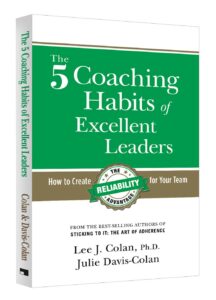Personal Reliability
A business that delivers reliable results is the sum of reliable teams, and reliable teams are the sum of reliable individuals. So, building reliable business results really starts with a leader coaching each team member to deliver reliable individual results.
Personal reliability is a cornerstone of leadership. Ken May began working at FedEx while he was in college. He started at the bottom sorting packages. He gradually worked his way up, becoming the Senior Vice President of North American Operations. He then became CEO of FedEx Kinko’s and is currently CEO of Topgolf. When asked about his career climb, May is quick to say, “I just work hard at whatever I do. I don’t complain. I don’t blame. I just work hard. I’m grateful for my job, my organization and my customers. I try to never promise what I can’t deliver.”
May knows that he can’t expect anything from his employees that he isn’t willing to model. His employees know they have a boss, a friend and an example in May. He, in turn, has a loyal workforce. As May has been heard to say, “Personal reliability at the top is the beginning of a successful organization, a dedicated workforce and loyal customers.”
3 Levels of Leadership
Leadership is an inside job. It starts inside with your personal leadership traits, such as integrity, trust, competence, authenticity – all of which are aspects of personal reliability. In fact, our company logo is a group of three stacked L’s representing the three levels of leadership: personal, team and organizational. You cannot expect your team to be reliable (or any other trait for that matter) if you are not being reliable. Since reliability, like leadership, is built from the inside out, the most important question a leader should ask is, “How reliable am I?”
Reliability is like rain – everyone knows they need it, but no one wants to get wet. It’s easy to talk about how “they” need to be more reliable, but it can be uncomfortable when we look in the mirror. When was the last time you heard someone say, “I really need to be more reliable”? We want to collect reliable people in our lives and on our teams. We do not want to deal with those who are unreliable. Think about it:
Reliable people get and keep friends more easily, forge deeper relationships, receive the best opportunities, are granted more autonomy at work, have more self-confidence, live with integrity and carry a clear conscience.
How Reliable Are You?
So, it’s time for you to take a look at yourself. How reliable are you?
After all, you must understand and exhibit reliability before you can expect it from others on your team.
Reliable people have a high say/do ratio. That’s the ratio of things you say you will do to the things you follow through on and do. In a perfect world, your say/do ratio is 1:1, meaning you have done everything that you said you would do. The reliable person has a rhythm of say, do, say, do, say, do. Keeping your word or simply doing the right thing is rarely convenient, but reliable people let their actions rise above their excuses.
Simply being aware of your say/do ratio can help change your behavior – improving your follow-through and more cautiously making promises.
Common, harmless statements we all often hear include: “I’ll call you later,” “I’ll bring that article in for you,” “Let’s have lunch sometime,” “I’ll see if I can find that email and forward it to you,” or “I’ll follow up next week.” They too often are just that – statements with no sense of personal promise behind them.
Reliable people do what they say. It seems so simple and at such a low bar to be reliable. You might ask whether people even remember all those little promises. They might not, but be assured they do notice when you deliver on them. When someone always follows through, it is impressive. It is the quickest way to build credibility and trust with others.
If you want to have a high say/do ratio, really think about your words. When you are about to say something that you will do, stop and ask yourself, “Do I really intend to act on this?” If the answer is “no,” then just don’t say it. Talk is cheap, but actions are like gold.
Being reliable does not mean saying “yes” to everyone. On the contrary, reliable people use discretion when they make commitments because they consider their commitments as personal promises to others. However, most people tend to slip on their commitments because they overestimate their available free time, want to please others, have unclear priorities and lack guiding principles for when to say “yes” or “no” to requests.
Natural barriers to negotiating achievable expectations include common human needs to please others, be accepted by them, be viewed as competent, be liked and to avoid conflict. Unfortunately, these needs are short-term versus long-term, revolve around my needs versus team needs and reflect insecurity versus confidence.
4 Keys of Personal Reliability
The four keys of personal reliability address these barriers:
- Know yourself
- Know your priorities
- Manage timelines vs. deadlines
- Speak the language of reliability
When all is said and done,
more is said than done.
– Aesop, Greek storyteller and author, Aesop’s Fables

